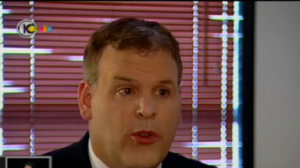 Canadian Foreign Minister John Baird, interviewed on Channel 10 on April 8, 2013.[/caption]
Canadian Foreign Minister John Baird, interviewed on Channel 10 on April 8, 2013.[/caption]OTTAWA � Canada is seeking to restore diplomatic relations with Iran � but not the old-fashioned way.
Instead of ambassadors and attaches, the foreign affairs department is aiming to connect with Iranians directly, via social media.
They�re working with the University of Toronto�s Munk School to host two days of discussions that will be live-streamed online in the hopes of reaching and inspiring Iranians ahead of June�s presidential elections.
�We stand with the courageous activists inside Iran, with the dedicated Canadian diaspora outside Iran and with freedom-loving people everywhere who want a brighter future for your country,� Foreign Affairs Minister John Baird said in a prepared text of opening remarks he was to deliver at the event.
Iranians last went to the polls in 2009 for a presidential election that many hoped would bring change to the repressive regime, but instead re-elected Mahmoud Ahmadinejad. That sparked days of protests which ended in a violent crackdown.
Two of the opposition candidates in that vote remain under house arrest.
Ahmadinejad is ineligible to run again, but the mood in the lead-up to June�s vote is less optimistic this time around.
International tensions are running high over Iran�s role in the Syrian crisis and its nuclear program.
Meanwhile, the Iranian government seems bent on quashing what opposition there might be during the election by pre-emptively cutting off or slowing down Internet access in recent days.
�What we�ve seen in the last several weeks has strongly confirmed what the regime fears most is the voice of the Iranian people,� said one of the Canadian government officials involved in organizing Global Dialogue: The Future of Iran.
He was only permitted to speak to reporters on the condition he not be named.
While Canada severed official diplomatic ties with Iran in September, efforts to keep a connection with the regime have continued through outreach with the Iranian diaspora in Canada and around the world, government officials said.
When asked what Canada could do help, there were many answers, but a similar theme.
�The Iranian people need weapons, but when they say weapons they don�t mean small arms or heavy weapons,� said the official.
�They mean access to the free Internet, the ability to have an unfettered conversation among themselves, the ability for people inside the country to hear the democratic voices based outside the country, the ability to connect and engage in a free and open debate about the future of their country.�
The event will feature around 50 members of the Iranian diaspora in Canada discussing topics chosen for being relevant during an election.
They include the economy, political participation, rights and diversity and how Iran can escape international isolation.
The panel will be streamed live on YouTube and through Facebook, Twitter and Google+ with the goal of having Iranians be able to listen in, ask questions and circulate the ideas shared.
Canada should have done more to support the millions of Iranians who protested against the 2009 elections, Baird said.
The international community needs to stand up now and support activists inside Iran, as well as human rights defenders, Baird said.
Meanwhile, the Iranian regime has to listen to its own people, he said.
By Global News
The Iran Project is not responsible for the content of quoted articles.










